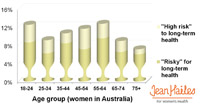Natural or Bioidentical Hormones

Natural or Bioidentical Hormones
Most women will pass through the time leading up to menopause (peri-menopause) and menopause itself with only mild – or no – symptoms. However, a percentage of women will have symptoms so bothersome that they may seek help.
Symptoms related to menopause such as hot flushes, night sweats, sleep disturbances, problems with the urinary system such as urinary leakage or urgency, vaginal dryness, formication (sensation of crawling or itching under the skin) and joint pains are related to a fall in the hormone, oestrogen. However, other symptoms such as fatigue, irritability and difficulty concentrating may be more related to the hot flushes and night sweats that reduce the quality of sleep.
The problem for women is where do they go to seek help to relieve the symptoms. Many have become fearful of hormone replacement therapy (HRT) used to relieve menopausal symptoms, after the release of findings from a major study in 2002. The study indicated higher levels of breast cancer (26%) in women using HRT and increased risks of heart disease, blood clots and strokes. However, the study had major flaws, and a subsequent review has shown that when used appropriately, HRT is a safe and effective therapy for symptomatic women around the time of menopause.
However, women remain concerned about the risks and are turning in large numbers towards so called -natural' hormone therapies, also known as -bioidentical' hormone therapy. Natural or bioidentical hormones are plant-derived products made up in pharmacies to provide individualised dosages for the relief of symptoms related to menopause. They are marketed as natural, safe, risk free, age reversing, sex enhancing, and as cancer preventing. However, women are being misled by these claims.
The main problem is that their effectiveness and safety has not been tested, and their use has been shown in some cases to cause serious health concerns such as endometrial cancer.
Fact 1# Natural is not always safe
The term natural implies -not synthetic' or -artificial', which is misleading. All plant-derived hormone preparations undergo a chemical extraction process to produce the final product. There is little difference between the end products used in bioidentical hormones and those used in many forms of HRT. Therefore, to claim bioidenticals are more natural is misleading.
Fact 2# Natural hormones are not the same as the hormones in our bodies
The term bioidentical hormone implies that the compounds more closely resemble hormones produced in the human body than HRT. The oestrogen, progesterone and testosterone used in bioidenticals are the same as those used in many forms of HRT.
Fact 3# Bioidentical hormones are not customised
Bioidentical hormones, which can be ordered over the internet, claim to monitor hormone levels via salivary testing as a way of individualising therapy. There is no evidence of a relationship between symptoms and measured salivary hormones, nor between salivary hormone testing and hormone tissue levels. In addition, many salivary hormone tests are not accurate. Hormone testing is not a reliable indicator of hormone levels due to irregular fluctuations, particularly around the time of perimenopause. Therefore, to claim dosages are tailored to an individual's hormonal profile is not based in science. The only method to monitor the effectiveness of hormonal therapy for the relief of symptoms is via self-report.
Natural or bioidentical hormone therapy is currently untested for safety and effectiveness and is not approved by the regulating body (TGA). There have been documented cases of harm caused by these therapies. Conventional HRT, when given to women in the right age group (50-59), in the lowest effective dose, is approved by the TGA and is safe and effective for the short term relief of menopausal symptoms.
Published with the permission of Jean Hailes for Women's Health 1800 JEAN HAILES (532 642) jeanhailes.org.au
Symptoms related to menopause such as hot flushes, night sweats, sleep disturbances, problems with the urinary system such as urinary leakage or urgency, vaginal dryness, formication (sensation of crawling or itching under the skin) and joint pains are related to a fall in the hormone, oestrogen. However, other symptoms such as fatigue, irritability and difficulty concentrating may be more related to the hot flushes and night sweats that reduce the quality of sleep.
The problem for women is where do they go to seek help to relieve the symptoms. Many have become fearful of hormone replacement therapy (HRT) used to relieve menopausal symptoms, after the release of findings from a major study in 2002. The study indicated higher levels of breast cancer (26%) in women using HRT and increased risks of heart disease, blood clots and strokes. However, the study had major flaws, and a subsequent review has shown that when used appropriately, HRT is a safe and effective therapy for symptomatic women around the time of menopause.
However, women remain concerned about the risks and are turning in large numbers towards so called -natural' hormone therapies, also known as -bioidentical' hormone therapy. Natural or bioidentical hormones are plant-derived products made up in pharmacies to provide individualised dosages for the relief of symptoms related to menopause. They are marketed as natural, safe, risk free, age reversing, sex enhancing, and as cancer preventing. However, women are being misled by these claims.
The main problem is that their effectiveness and safety has not been tested, and their use has been shown in some cases to cause serious health concerns such as endometrial cancer.
Fact 1# Natural is not always safe
The term natural implies -not synthetic' or -artificial', which is misleading. All plant-derived hormone preparations undergo a chemical extraction process to produce the final product. There is little difference between the end products used in bioidentical hormones and those used in many forms of HRT. Therefore, to claim bioidenticals are more natural is misleading.
Fact 2# Natural hormones are not the same as the hormones in our bodies
The term bioidentical hormone implies that the compounds more closely resemble hormones produced in the human body than HRT. The oestrogen, progesterone and testosterone used in bioidenticals are the same as those used in many forms of HRT.
Fact 3# Bioidentical hormones are not customised
Bioidentical hormones, which can be ordered over the internet, claim to monitor hormone levels via salivary testing as a way of individualising therapy. There is no evidence of a relationship between symptoms and measured salivary hormones, nor between salivary hormone testing and hormone tissue levels. In addition, many salivary hormone tests are not accurate. Hormone testing is not a reliable indicator of hormone levels due to irregular fluctuations, particularly around the time of perimenopause. Therefore, to claim dosages are tailored to an individual's hormonal profile is not based in science. The only method to monitor the effectiveness of hormonal therapy for the relief of symptoms is via self-report.
Natural or bioidentical hormone therapy is currently untested for safety and effectiveness and is not approved by the regulating body (TGA). There have been documented cases of harm caused by these therapies. Conventional HRT, when given to women in the right age group (50-59), in the lowest effective dose, is approved by the TGA and is safe and effective for the short term relief of menopausal symptoms.
Published with the permission of Jean Hailes for Women's Health 1800 JEAN HAILES (532 642) jeanhailes.org.au
Have You Seen This?
MORE











